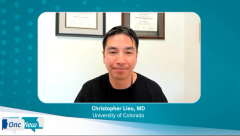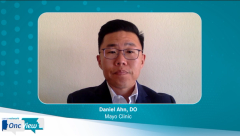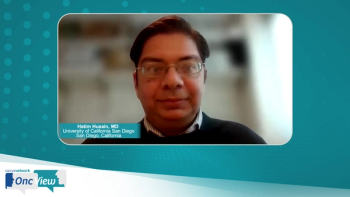
Unmet Needs and Open Questions in Early CRC
Dr. Christopher Lieu shares his insights into gaps in care in the adjuvant setting in colorectal cancer.
Episodes in this series

Kristie L. Kahl: Can you discuss the challenges around treatment decision-making in the adjuvant setting?
Christopher Lieu, MD: In terms of what we talked about, how do we use this test to really guide the treatment of stage II and stage III disease? When you think about stage 3 colon cancer in general, if you take 10 patients with stage III disease, we are needlessly treating about 7 or 8 patients completely needlessly with stage III disease, and the reason why is because 5 patients with stage 3 disease of that 10, are cured with surgery alone. Therefore, they never needed chemotherapy to help them be free of their cancer.
We know that 2 or 3 patients, depending on the risk of stage III disease, are going to have relapse whether to get adjuvant therapy or not. Thus, that means that of the remaining 2 to 3 patients, those are the patients that truly have their cancer not come back because of chemotherapy. If you think about the fact that if you take 10 patients with stage 3 colon cancer, and we're needlessly treating 7 to 8, what I would say is that, the minimal residual disease [MRD] assays or ctDNA [circulating tumor deoxyribonucleic acid] assays that are currently available and that will be available in the future, may help us identify the 5 patients that are cured with surgery alone and may tell us a little bit more information about who the 2 or 3 patients are that are left, that are going to have disease recurrence if we give them standard of care FOLFOX [folinic acid, fluorouracil, oxaliplatin] or CapeOx [capecitabine plus oxaliplatin] in the adjuvant setting. Going forward, maybe those are the patients that might benefit from even more intensification of therapy, and then maybe we can better identify the 20% or 30% of patients that are truly having their lives saved because of adjuvant chemotherapy? I think that that is the future of how these assays are going to be used.
Kristie L. Kahl: What are some of the unmet needs in this setting? What are some of the next advances that we should be watching out for?
Christopher Lieu, MD: When you think about some of the unmet needs in this setting, we think about some of the trials in this stage II setting. The one that's currently available in the United States is the COBRA trial being led by Dr Van K. Morris, MD, at The University of Texas MD Anderson Cancer Center, and that is a nationwide trial looking at the impact of testing as well as if patients are ctDNA positive, whether or not they benefit in that setting from getting chemotherapy. Notably, these are all patients with stage II colon cancer that would typically not receive chemotherapy, so they're considered low-risk stage II disease. There's a trial upcoming for stage IV colon cancer looking at the presence or absence of ctDNA. If patients are ctDNA negative, that trial will actually randomize patients to no chemotherapy versus getting standard of care chemotherapy, and if patients are ctDNA positive, they'll be randomized to receive standard of care FOLFOX or CapeOx versus FOLFOXIRI [folinic acid, 5-fluorouracil, oxaliplatin and irinotecan] or FOLFIRINOX [folinic acid, fluorouracil, irinotecan, oxaliplatin]. In other words, an intensification of therapy. I think that these trials will help start answer the question, “Does testing save lives? Yes or no?” Does testing and a change in treatment save lives? Can it prevent patients from having to needlessly receive chemotherapy? I think that those studies are really going to be informative in terms of how we utilize these therapies, or this type of testing in the future.
This has been an excellent discussion, and we hope that you find the information valuable to your clinical practice. Thank you all for watching this contemporary CancerNetwork® KCast program from MJH Studios®.
Transcript edited for clarity.
Newsletter
Stay up to date on recent advances in the multidisciplinary approach to cancer.



































